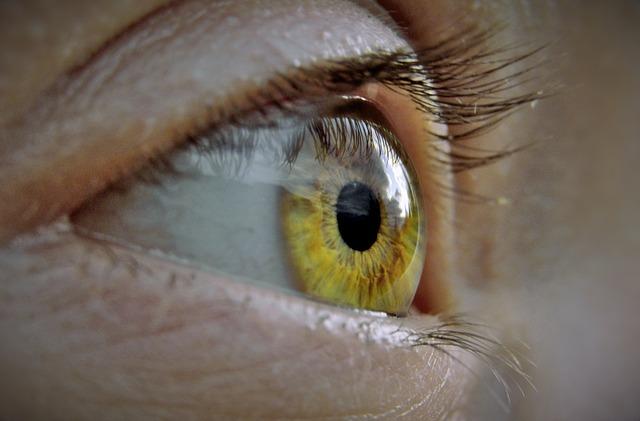As the years gracefully unfold, our eyes serve as steadfast windows to the world, capturing the vibrant tapestry of life’s moments—from the first light of dawn to the gentle hues of twilight. Yet, like an artist’s brush that may wane with time, our vision too can face the inevitable wear of age. But fear not, for this journey need not be one of dimming sight and lost clarity. Instead, it can be a path illuminated with knowledge, care, and mindful practices. In this article, we explore the art of nurturing your vision and safeguarding your eyes, ensuring they remain as vibrant and resilient as the stories they behold. Join us as we delve into the ways you can embrace this journey with empathy and wisdom, so your world continues to shine brightly, no matter the years that pass.
Nourishing Your Eyes: The Role of Nutrition in Vision Health
Our eyes, like every other part of our body, benefit immensely from a well-balanced diet rich in essential nutrients. As we age, maintaining a diet that supports eye health becomes increasingly important. Certain nutrients have been shown to play a significant role in maintaining good vision and potentially reducing the risk of age-related eye diseases. Here are some key nutrients and foods to consider incorporating into your diet:
- Omega-3 Fatty Acids: Found in abundance in fish like salmon and mackerel, these healthy fats can help maintain retinal health and reduce dry eye symptoms.
- Vitamin C: This powerful antioxidant, present in citrus fruits and vegetables like bell peppers, aids in protecting the eyes against oxidative stress.
- Vitamin E: Nuts and seeds are excellent sources of this vitamin, which helps combat free radicals that can damage eye cells.
- Zinc: Vital for the formation of melanin, a protective pigment in the eyes, zinc can be found in foods like chickpeas, beans, and oysters.
- Lutein and Zeaxanthin: Often referred to as the “eye vitamins,” these carotenoids are found in leafy greens such as spinach and kale, and are known to filter harmful blue light.
By incorporating these nutrients into your daily diet, you can provide your eyes with the nourishment they need to stay healthy as you age. Remember, small dietary changes can lead to significant benefits in your vision health.

Exercise for the Eyes: Simple Practices to Strengthen Your Sight
As we navigate the journey of aging, it’s important to nurture our vision with simple yet effective practices. Just as we exercise our bodies, dedicating a few moments each day to eye exercises can make a world of difference. Begin with the palming technique—gently rub your palms together to generate warmth, then place them over your closed eyes without applying pressure. Feel the warmth seep in, soothing and relaxing your eye muscles. This technique not only offers a moment of tranquility but also reduces eye strain.
Incorporate the 20-20-20 rule into your daily routine. For every 20 minutes spent staring at a screen, take a 20-second break to look at something 20 feet away. This practice helps in reducing digital eye strain, a common concern in our tech-driven lives. Additionally, try focusing on distant objects by gazing out a window or stepping outside to take in the horizon. These small, mindful practices can enhance your visual acuity and promote eye health over time. Embrace these moments of care as a gift to your future self, ensuring that your vision remains as sharp and vibrant as your spirit.

The Power of Rest: Why Sleep is Essential for Eye Health
In the hustle and bustle of daily life, rest often takes a backseat, yet it is a vital pillar for maintaining eye health, especially as we age. During sleep, our eyes are nourished and rejuvenated, allowing them to recover from the constant strain they endure throughout the day. Sleep is the natural balm that heals and refreshes the eyes, ensuring they remain vibrant and clear. Without adequate rest, the eyes can suffer from symptoms like dryness, irritation, and even blurred vision, which over time, could lead to more severe complications.
- Reduced Eye Strain: Adequate rest helps to alleviate the strain on eye muscles, which is crucial for preventing long-term damage.
- Improved Circulation: Sleep enhances blood flow, delivering essential nutrients to the eyes and aiding in detoxification.
- Prevention of Dark Circles: Consistent sleep patterns help reduce puffiness and dark circles, promoting a youthful appearance.
- Enhanced Focus: A well-rested mind can focus better, reducing the need for the eyes to overcompensate, which can lead to fatigue.
By prioritizing rest, you are not only investing in your overall well-being but also safeguarding the precious gift of sight. A good night’s sleep can be the simplest, yet most effective strategy in your eye care arsenal.
Shielding Your Sight: Protective Measures Against Age-Related Decline
As the years pass, safeguarding your vision becomes increasingly important. Fortunately, there are numerous ways to protect your eyes from age-related decline. Start by embracing a diet rich in eye-friendly nutrients. Incorporate foods high in omega-3 fatty acids, lutein, zinc, and vitamins C and E. These nutrients help combat age-related vision problems, like macular degeneration and cataracts. Consider adding the following to your meals:
- Leafy green vegetables such as spinach and kale
- Fatty fish like salmon and tuna
- Citrus fruits including oranges and grapefruits
- Eggs, nuts, and beans
Beyond nutrition, lifestyle choices also play a pivotal role in preserving your vision. Regular eye exams are essential, as they allow for early detection and treatment of potential issues. Additionally, practice the 20-20-20 rule to reduce eye strain: every 20 minutes, look at something 20 feet away for at least 20 seconds. Protect your eyes from harmful UV rays by wearing sunglasses that block 99% to 100% of UVA and UVB rays, even on cloudy days. By integrating these practices into your daily routine, you can significantly reduce the risk of age-related vision decline and continue to enjoy the world in all its vibrant detail.


